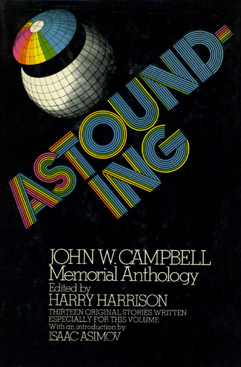This article relies largely or entirely on a single source .(June 2025) |
 | |
| Editor | Harry Harrison |
|---|---|
| Cover artist | John Sposato |
| Language | English |
| Subjects | Science fiction, Fantasy |
| Publisher | Random House |
Publication date | 1973 |
| Publication place | United States |
| Media type | Print (Hardcover) |
| Pages | 302 |
| ISBN | 9780283981586 |
Astounding: John W. Campbell Memorial Anthology is a 1973 anthology honoring American science fiction and fantasy editor John W. Campbell, in the form of an anthology of short stories by various science fiction authors, edited by Harry Harrison. It was first published in hardcover by Random House as a selection of the Science Fiction Book Club, and first published in paperback by Ballantine Books.
The stories were contributed by writers who had been previously published in the pages of Analog, the publication that Campbell had edited for many years. The book includes a foreword by Isaac Asimov [1] and an afterword by Harry Harrison, and each story is prefaced by comments either by the author or the editor. It won the 1974 Locus Award for Best Anthology.